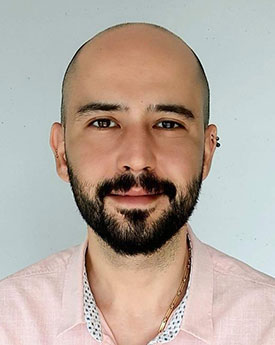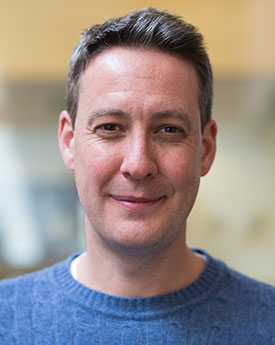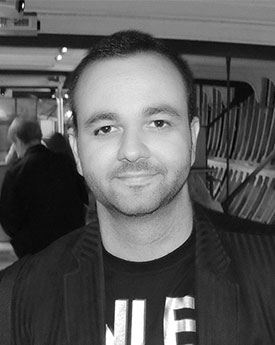Supervisors in Design
Read about our tutors who consider supervising projects in Design. Further information about our PhD Design scheme can be found on our course pages.
Loading People
We couldn't find anybody who matched your criteria
I am keen to supervise PhD work spanning three distinct yet interrelated pillars: (1) open design and distributed production/economies, (2) design for sustainability and circular economy, and (3) new concerns of design management (including gender, collaboration, models of innovation and transitions).
Speculative Design, Critical Design, Design Fiction, Design Futures, Design as Rhetoric, Game Design
I have a wide range of design interests including collaborative design, co-design, community working, creative engagement, design for policy, collaborative system change. I'm also interested in design methods and research through practice. I have worded across product design, graphic design and digital design.
Please contact me regarding PhD enquiries based on my research interests: Design Frameworks, Urban Design Placemaking, Digital Planning, Environmental Modelling and Mapping, Participatory Practices, Emerging Technologies (Drones, Digital Twins), Systems and Games.
Future Cities, Cities at Night, More-than-human Design, Night Studies, Public Spaces, Smart Cities, Urban Design, Creative Practices, Design Futures
I have a wide range of interests and have worked on a variety of projects both in and outside of academia. I welcome PhD proposals that are interested in 1) designing better experiences/solutions, be those digital, physical, or both; 2) the role technology plays in designing experiences/solutions and the friction we get from using technical solutions; and 3) ‘translating’ academic knowledge into public engagement. I am extremely interested in provoking and probing the future, so we can live behind ‘better presents’. I am a maker and I approach my research through the act of making, sometimes engaging with Speculative Design, Design Fiction and/or Critical Design.
My research is interdisciplinary and crosses areas including design, computer science, and fan and audience studies. I am particularly interested in supervising PhD projects relating to: Speculative Design and Design Fiction; Ethical challenges relating to new and emerging technologies; Fan studies, particularly relating to digital/physical fan activity and online communities; The interaction with the above topics and Design for Policy.
Through my UKRI Future Leaders Fellowship my Design Research Works group participates in a wide range of research projects. My work has three main themes 1. Show the world what it can gain from Design Research. 2. Use innovative Design methods to conduct groundbreaking research exploring the impact of Artificial Intelligence. 3. Drive forward More Than Human Design helping to understand how to design a better future. Some recent projects include: - Ryelands AI Lab, where we are pioneering AI education in a primary school. - Permission to Muck About, a feature length documentary film including interviews with some of the world's leading design researchers. - Shadowplay, an immersive installation and collaboration platform using physical movement as a way of controlling generative AI - Seeing with Sound, using computer games to understand how to enhance accessibility for the visually impaired. - Fixing the Future, a multi-institution project exploring the right to repair and smart devices. - Responsible AI Licensing, an international group working to create licences to support open source but responsible sharing of AI innovations. I aspire to offer affiliative and democratic leadership to both my team and my field. My vision is to promote the value of design research, particularly focusing on how it can be used to help technology make the world a better place. I am an open collaborator and am always willing to share what I know and why I'm interested in it. If you would like to discuss how we can work together or find out about any of the initiatives I am involved with, then please reach out to me.
I welcome proposals in any topic that speak to the broad areas of history, urban studies, and arts and heritage. I encourage proposals that are comparative, engage in a dialogue across disciplines, and have an international dimension. I particularly welcome projects that explore the relationship between history and the future.
Michael's practice-based research is interdisciplinary and cuts across fields including Design, Sustainability, Computer Science, Future Studies and Science and Technology Studies. Michael welcomes PhD proposals interested in researching new ways for designing and adopting more sustainable, regenerative and more-than-human products, services, policies and infrastructures across society. This work will increase our understanding of the deepening relationship between environmental and social sustainability issues and emergent technologies (like the Internet of Things, Artificial Intelligence, Digital Fabrication and Edge Computing) and develop methods and practice for redressing climate change now and into the future. Such research will draw upon and advance interdisciplinary research fields including Design for Sustainability, More-than-Human-Centred Design, Regenerative Design, Multi-Species Design, Pluriversal Design, Sustainable Interaction Design, Transition Design, Biodesign and Post-growth Innovation. Please get in touch with Michael to discuss your PhD research ideas and supervision - m.stead1@lancaster.ac.uk
Lisa has supervised numerous PhDs that relate to sustainability, health, and wellbeing. She is interested in PhD proposals that seek to investigate the relationship of design to sustainability, health, and wellbeing especially those with a focus on technological mediation, human values and moving beyond eco-modern approaches to design.
















